Movie Review – My Week With Marilyn
Terrific performances all round, plus a dedication to the look and feel of 50’s England, create a genuine sense of realism and heart in this story-behind-the-story of the production of Monroe’s pre-Some Like It Hot vehicle, The Prince and The Showgirl. Williams is astonishing, while Branagh almost steals the show; the heart and soul belongs to Eddie Redmayne in the role of Colin, Monroe’s confidante and love-interest at the time (although she was newly married to writer Arthur Miller) who portrays the “ache of longing” for the brief moment of affection Monroe throws his way with such effortless skill it’s a wonder to behold. Truthfully? I’d love to have spent more than a week with this Marilyn – much more, in fact. This film is wonderful.
– Summary –
Director : Simon Curtis
Year Of Release : 2011
Principal Cast : Michelle Williams, Kenneth Branagh, Eddie Redmayne, Emma Watson, Julia Ormond, Judi Dench, Dominic Cooper, Zoe Wannamaker, Dougray Scott, Derek Jacobi, Toby Jones, Michael Kitchen.
Approx Running Time : 101 Minutes
Synopsis: Marylin Monroe arrives in England to shoot a film with Sir Laurence Olivier, and finds herself befriending a local lad through the production.
What we think : Terrific performances all round, plus a dedication to the look and feel of 50’s England, create a genuine sense of realism and heart in this story-behind-the-story of the production of Monroe’s pre-Some Like It Hot vehicle, The Prince and The Showgirl. Williams is astonishing, while Branagh almost steals the show; the heart and soul belongs to Eddie Redmayne in the role of Colin, Monroe’s confidante and love-interest at the time (although she was newly married to writer Arthur Miller) who portrays the “ache of longing” for the brief moment of affection Monroe throws his way with such effortless skill it’s a wonder to behold. Truthfully? I’d love to have spent more than a week with this Marilyn – much more, in fact. This film is wonderful.
**********************
First love is such sweet despair.
While nowadays the word “icon” is bandied about with seemingly no regard for just what the word means, attached to many “stars” of screen, stage and song who probably don’t really deserve it, it’s fair to say that in the annals of Hollywood lore, Marilyn Monroe has become perhaps the very definition of such a term. Appearing in a small number of films in what became a career cut short by tragedy (she died, aged 35, in 1962), Monroe’s legacy has been that of the idealized sex-symbol, the “blonde bombshell” with whom the whole world loved, but who only wanted to be loved not for who she pretended she was, but for who she actually was. And you know you’ve made it when Elton John writes a song about you. The tragedy of Monroe is revisited here, in Simon Curtis’s loving, lovely biographical effort, an effort which gives us a peek into the background of this revered figure in cinema, during a time of great personal upheaval for the young star. But is the film flawed in its portrayal of the legendary actress? Does Curtis’s almost picture-postcard memorializing of Monroe’s demons and love affair with budding filmmaker Colin Clarke touch deeper than the act and into the soul of the human behind it?
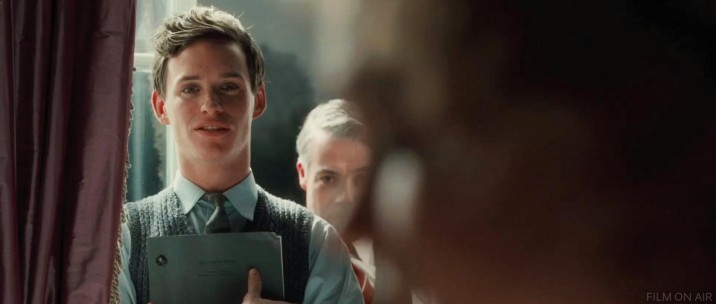
Colin Clarke (Eddie Redmayne) leaves the family home to work in the film industry, gaining a job as a third assistant on British acting legend Sir Laurence Olivier’s (Kenneth Branagh) latest film production, a comedy entitled The Sleeping Prince (the film would later become known as The Prince & The Showgirl) which was to star both Olivier and the rising star from Hollywood, Marilyn Monroe (Michelle Williams). When Monroe arrives in England to begin shooting, having just been married to her third husband, American playwright and literary giant Arthur Miller, Colin begins to dicover that the glitz and glamor of being such a major star often hides a painful truth. Monroe’s relationship with her latest husband (she was previously married to Joe DiMaggio, the famous baseballer, and New York police officer, Jim Dogherty) wasn’t as rock solid as the newsreels would have people believe, and when Miller returns to America, leaving Monroe alone with the staid, stodgy rule-restricted British film industry, she turns to the young Colin for comfort in her time of loneliness. Monroe’s increasingly temperamental attitude to filming causes angst amongst the production, most notably director and co-star Olivier, who derides her and upbraids her in front of the crew for causing the production to falter. However, the calming influence of Colin seems to get Monroe through her personal issues, of which there is seemingly a multitude, allowing the film to be completed – the main question being, what will happen to her burgeoning relationship with the young Brit when she’s set to return to America?
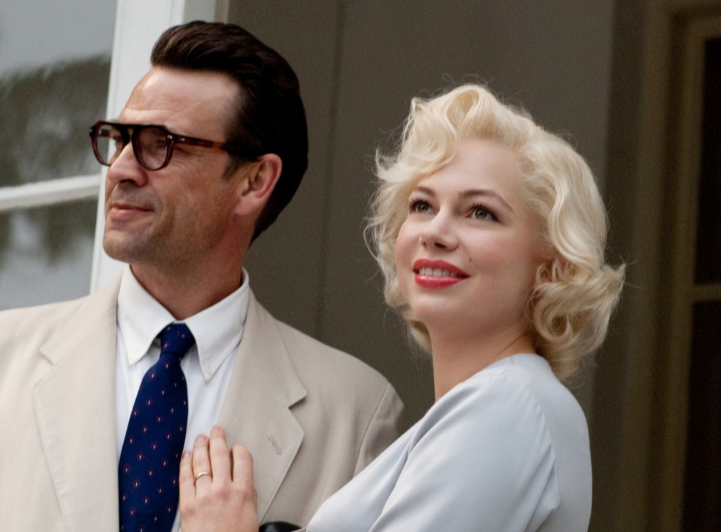
Part bio-pic, part drama, part history lesson on British film, My Week With Marilyn traces the production of the 1957 film The Prince & The Showgirl, and in doing so, opens up a small portal into another world – a world long now a distant memory for most, although one still quite charming and quaint. Calling this film quaint is to do it a disservice, however, because the central performances by the three main leads allow us to experience what it must have been like to have that zephyr brush with fame back when movie stars were really stars – not the crude, passionless celebrities we have today. Stories and legends of Monroe have only grown over the time since her untimely passing, although this tangential retelling of Colin Clarke’s biographical book of the same name tries to remove a lot of the hype and present the actress as a tortured, lonely soul who seeks comfort with apparently anyone with a grasp of empathy. My Week With Marilyn isn’t an indictment on the actress’s failings, nor is it some kind of syrupy love story, although hints of this abound through the latter half of the movie; what the film does is try and present a kind-of Notting Hill for the pre-TMZ crowd, a film-centric version of Almost Famous, if you will. Parallels with those two films are evident here, although it must be said that director Simon Curtis does a lovely job presenting the film as something of an original piece. Perhaps the most pertinent part about the whole thing is that it actually happened.

The film is told primarily through the eyes of Colin Clarke, essayed here by Eddie Redmayne; the role is largely a pivot for events to transpire around, rather than a genuinely moving character – the script puts Colin right into the thick of things nearly instantly, gives us a tepid family backstory that’s hit-and-miss, and in tries to shoehorn in a lackluster romance with Emma Watson’s costume designer character; Colin’s motives are generic, but Redmayne is such a forthright performer, and so giving of his craft to his fellow cast-members, that he somehow elevates his rather thin character into one which resounds as the central Everyman. Redmayne delivers a gobsmacked awe when confronted by a naked Monroe, and it’s that moment early in the film where he just wins you over. Deficiencies with Colin as a character aside, Redmayne’s performance is strong enough even with limited material to work well, especially his scenes with Branagh and Williams, both of whom could outshine him in every way.
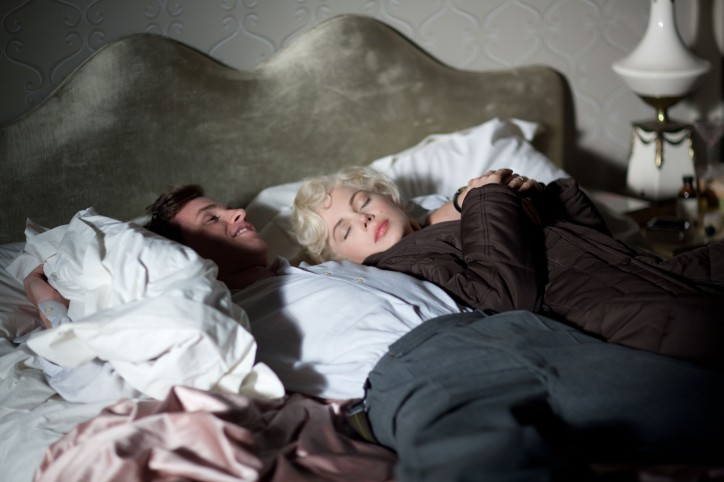
Kenneth Branagh is himself a legend of the acting fraternity – he was once described as “the next Laurence Olivier”, a moniker he’s responded to with due respect and awe, yet strangely seems ill-at-ease with such a burdensome weight – and he delivers in this, perhaps his most complete performance in years. His portrayal of Olivier is, to my mind, nuanced and respectful, restrained and angry when required in due process, slipping into the role like it was one he was always destined to play. The script, by Adrian Hodges, gives Branagh some of the films’ best lines, although Branagh is ably accompanied by a raft of top-line British talent in even minor roles. Judi Dench, as the matriarch of the film, Dame Sybil Thorndike, has a small part to play, but as you’d expect from Dench, once more shows us why she is one of the greatest living British actresses alive today. She says more with her face and eyes in a two minute scene and three lines of dialogue than many of her peers can in three complete films.
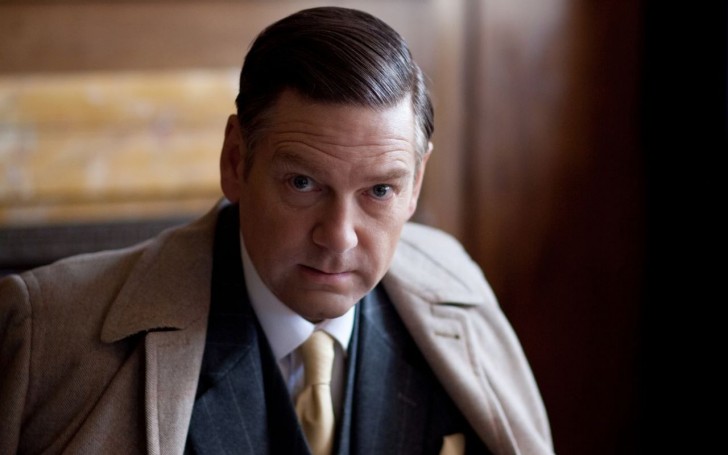
Harry Potter actress Emma Watson feels out of her depth as Colin’s initial love-interest, the intransigent Lucy, a role I felt was poorly written yet somehow required for the narrative arc between Colin and Marilyn to work as well as it did. The scenes with Redmayne and Watson felt unbalanced, as if Curtis wasn’t quite sure how to handle this narrative – Colin’s on set for five minutes and he’s already bedding Hermione Grainger and Marilyn Monroe? Next he’ll be cast as James Bond! The denouement with Colin and Lucy is perhaps the weakest moment of the film, to me. Watson’s smallish role aside (she’s good in it, even if it’s poorly constructed), the rest of the cast and their roles are brilliant. Cameos to Derek Jacobi as a curator at Windsor Castle, Toby Jones as talent agent Arthur Jacobs, and Julia Ormond as Olivier’s wife, Gone With The Wind star Vivien Leigh, add to the ensemble verisimilitude of the film, giving Curtis the depth of talent in front of the camera to really pull every nuance of entertainment from it. Yet, for all the tribulations of the cast, the film hangs on the performance of Michelle Williams, tasked with the unenviable job of portraying one of the worlds most photographed women.
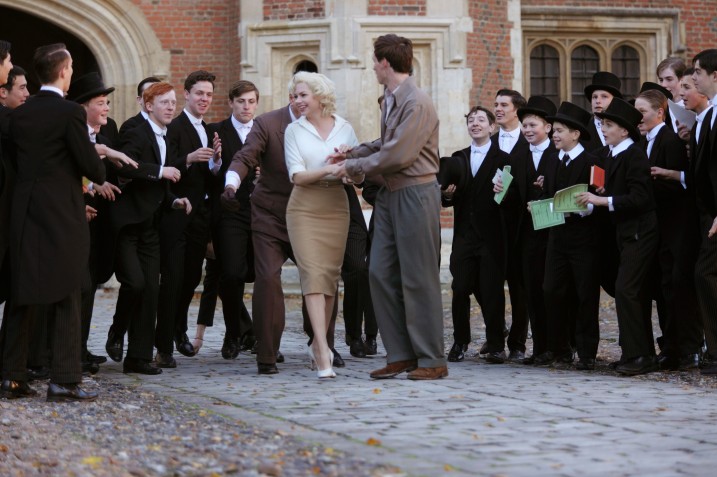
Williams is commendably solid as Monroe – her look and mannerisms are spot on for the most part – even if the film lacks the courage to really dig into her personal issues. Marilyn was an act, an act put on by Norma Jean Baker, and an act which fooled a hell of a lot of people: at one point, on their idyllic sojourn through Windsor Castle with Colin, when the pair encounter a group of adoring staff, Monroe turns to Colin and whispers “shall I be her?”, before “turning on” the Monroe persona for those who want it. This simple scene, wrapped in what appears to be the personification of a human trapped by their own success, is the moment My Week With Marilyn really sold itself as a great film. Norma Jean recognizes that perhaps she’ll never be rid of the Monroe persona, and I’d suggest that a lot of the angst and depression the actress suffered from was a direct result of this inability to escape. As so succinctly explained in The Shawshank Redemption, peopled wanted “the star”, and didn’t want “the reality”. The reality, as portrayed in this film, is that Monroe was a prisoner of her own publicity, and couldn’t handle the pressure of it. Colin, in the precious week he spends with the star as they shoot the film, manages to lift the veil of Monroe’s emotional problems, although he is never able to offer a solution other than “run away with me”; Marilyn assures him, somewhat drone-like, that she is happy with her life.
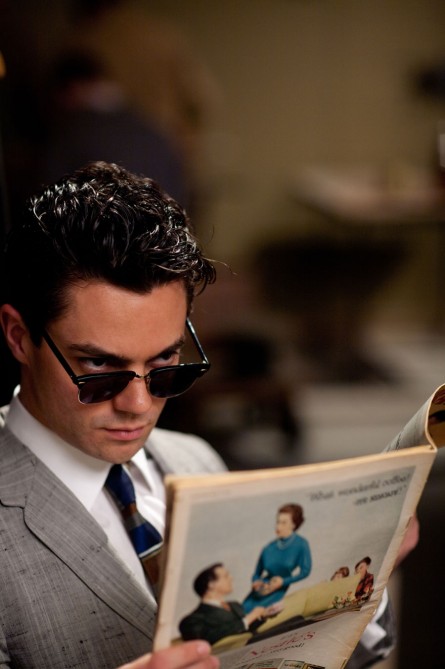
My gut reaction to Williams’ portrayal of Monroe is that I think had Marilyn lived to see this film, she might have been happy with the way Williams went about it. Williams inhabits the woman, she truly becomes Monroe, to the point where you forget all the real-life issues she’s had (Heath ledger’s death, primarily) and appreciate the nuances and gratifyingly solid morphing into a real, living, breathing person with a tortured soul. Yes, Williams was most deserving of that Oscar nomination. Kudos to her – in fact, kudos to the entire cast, none of whom really put a foot wrong. Curtis’s direction feels like he’s crafting a real film here, telling a story with the definitive direction he wants to go in, although I often felt a little more time could have been spent examining more of the background to Monroe’s personal problems. The interplay between Monroe and the production of the film they’re making is excellent – almost wince-inducing at times – and Branagh seethes perfectly as the ingenue runs roughshod over the whole shebang.
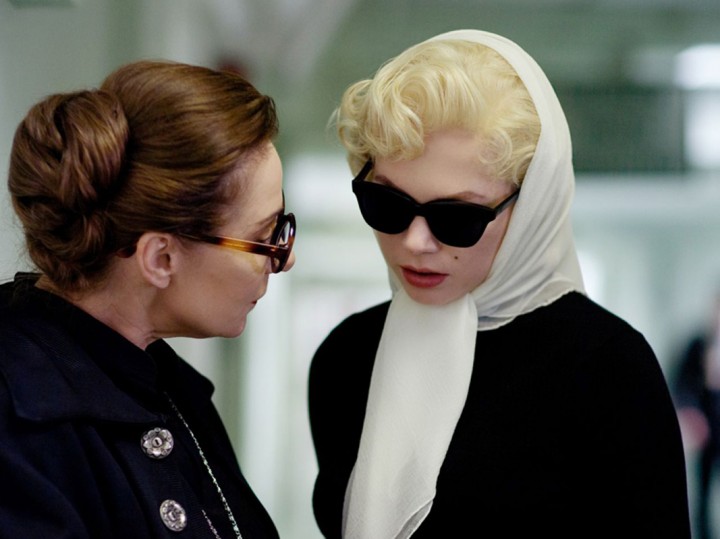
If there’s a real negative to be found anywhere with the film, it’s that so much is left unexplained (or unsaid) that I really wanted to see. Arthur Miller’s attitude to Monroe, his new wife for crying out loud, is one of callous indifference – call it artistic hubris – and I think this is Dougray Scott’s best role yet (I wasn’t ever really a fan of his, but I think he’s solidified his craft since he wafted into Ever After). I wanted to see more of the Miller/Monroe dynamic, really. I wanted to see Miller’s ambivalence to Monroe’s deep-rooted personal issues, and his apparent lack of concern at her dependence on positive reinforcement, given larger scope. There’s a hint of things unsaid, a hint of the unspoken thoughts of both personalities that you just wish could be uttered, but aren’t. Same goes for Olivier and his wife, Vivien Leigh – both Ormond and Branagh have terrific chemistry with each other, although their fractured on-screen relationship is equally threadbare in its impact, thanks to the focus remaining on Monroe and Colin. Fair enough, I guess, but developing this aspect of the story might have served to allow the audience to understand why Olivier treated Monroe the way he apparently did. Essentially, all I really wanted from this film was more of the backstory and subtext in the ancillary characters – hell, most of these characters could have warranted a film of their own, they’re so interesting! – but was happy to accept what I was given. And if wanting more from a film which delivers so much already is a bad thing, then that’s a good thing in reality.
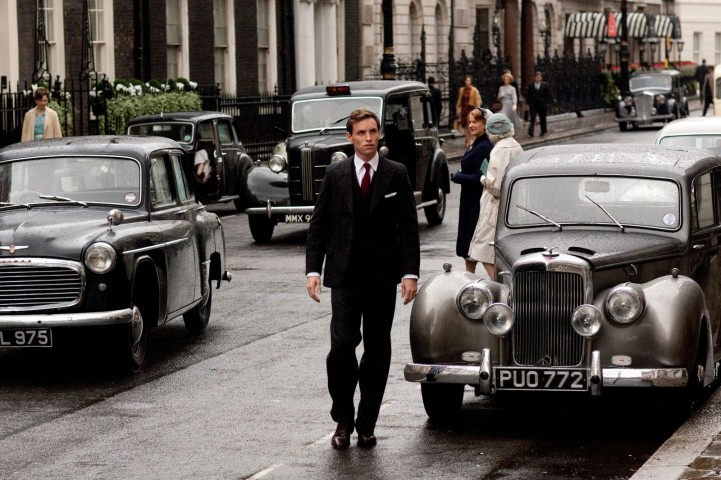
My Week With Marilyn is a subtle, solid British film, a film that never oversteps itself into parody or overproduced storytelling (in fact, I think one might describe the style of storytelling here as “reserved”), and one in which the harsh light of truth is once more shone directly on the worlds most iconic Hollywood actress. Whether this is all entirely true we’ll never really know (the real Colin Clarke passed away in 2002) but part of me hopes that, even if some of it is dramatically liberal, the underlying love and heart is a solid foundation. It is truly a magnificent film, this one. Although I had reservations as to the “acting” of Williams in the pivotal role of Monroe (I wasn’t impressed with her in Shutter Island) I found My Week With Marilyn to be a charming, effortlessly enjoyable journey back in time to a period when celebrity meant paparazzi and press – not a multi-platform media blitz and social media interaction. Top shelf film-making, and thoroughly recommended.


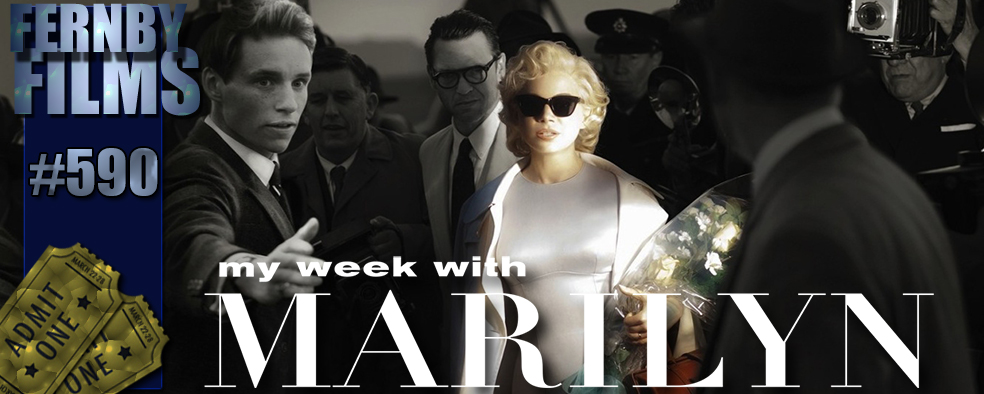



Wow, your review makes Marilyn tempting but i have the same allergy to icon movies that i do to romantic comedies. So, my question to you, good sir, is this: Will i like it? Is it good? Or, less succinctly, is it good for ME?
My recent post Dregs of the Week: Mostly March 2013
This film will probably give you a runny nose, blocked sinuses and a splitting headache, Al, so I'd avoid it if I were you.